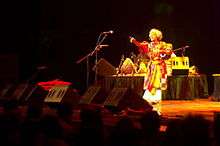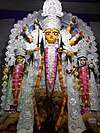Alkap
Alkap (Bengali: আলকাপ) is a form of Bengali folk performance popular in the districts of Murshidabad, Malda and Birbhum in West Bengal and Chapai Nawabganj, Randajshahi in Bangladesh.[1] It has also spread to the adjoining areas of Jharkhand and Bihar such as Dumka and Purnia.[2]
| Part of a series on the |
| Culture of Bengal |
|---|
 |
| History |
|
|
Mythology and folklore |
| Cuisine |
|
Festivals
|
|
Genres
Institutions
Awards
|
|
Music and performing arts Folk genres Devotional Classical genres
Modern genres
People Instruments Dance Theater
Organizations People |
|
Sport
|
|
|
Etymology
Kaap means ‘kavya’ (verse) and Aal is part of the verse.[2] Again, one of the meanings of the word Aal is ‘sharp’. On the other hand, the word Kaap is one of the many meanings of ‘sam’ - a distorted form of gesture in the arena, or an image of a humorous comedian or social ugly subject.[3]
Form
Alkap is an amalgamation of music, dance and theatrical presentation. An alkap group of ten to twelve performers is led by a sarkar (master) or guru (leader) and includes two or three young men called chhokras, one or two gayens or singers, dohar, choristers, and musicians. Alkap is presented in five parts: Asar Vandana, Chhora, Kaap, Baithaki Gaan and Khemta Pala. The programme is a reflection of rural society and puts the focus on the prevailing socio-economic condition of the rural masses.[1][2]
In popular culture
Syed Mustafa Siraj's Mayamrdanga novel is written about an Alkap team.
References
- Ahmed, Wakil. "Alkap Gan". Banglapedia. Asiatic Society of Bangladesh. Retrieved 2009-03-22.
- "Sudkhor". The Telegraph, 18 July 2003. Retrieved 2009-03-22.
- Ghosh, Binoy, "Culture of West Bengal", Volume III, First Edition, Prakash Bhawan, Page 69.
